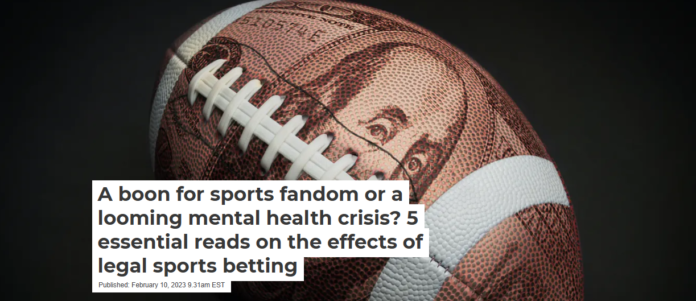

A lifelong sports fan, I grew up hearing tales of sports figures felled by gambling scandals – baseball stars “Shoeless” Joe Jackson and Pete Rose, the 1978-79 Boston College basketball team and NBA referee Tim Donaghy.
Sports leagues wanted nothing to do with gambling, which they feared would taint the integrity of the game. They had lobbied heavily for the passage of the Professional and Amateur Sports Protection Act of 1992, also known as the Bradley Act, which banned sports betting in the U.S.
Then, in May 2018, the Supreme Court overturned the Bradley Act.
This time, the leagues and networks were fully on board. Gambling ads for companies like DraftKings, BetMGM and FanDuel started appearing in arenas and beaming across airwaves. Las Vegas Raiders wide receiver Davante Adams signed a sponsorship deal with MGM. And point spreads started being prominently featured on sports media outlets.
Download these articles in a magazine-style ebook
Curious, I started placing some bets myself. I instantly grasped the allure: Here I was, watching games that I would have otherwise never watched – that didn’t involve my favorite teams, the Red Sox and Patriots – and I was engaged and excited from start to finish. The leagues, too, must have been keenly aware of this opportunity to engage fans when they decided to change their tune on gambling.
With the five-year anniversary of the Supreme Court’s decision approaching, I wanted to learn more about what scholars at the forefront of gambling research had been discovering. How many people were betting on sports? For those who criticized the Supreme Court decision five years ago, was their hand-wringing misplaced? Were rates of problem gambling actually on the rise? If so, who was most at risk?
Gambling research can be challenging; laws and regulations vary by state, and gambling researchers receive almost no federal funding.
But a small and dedicated group of scholars in the U.S. and abroad have been gauging the impact of this new era in American sports. With few regulations in place, gambling companies are going all-in to attract as many customers as possible – with younger, sports-obsessed and smartphone-savvy Americans particularly vulnerable.
1. A new fan experience
Prior to becoming the chair of Penn State’s sports journalism program, John Affleck had worked as a sports reporter and editor for The Associated Press. Both in the newsroom and in his early years at Penn State, there was nary a peep about gambling.
Now he notices his students regularly talking about the point spread and over/under for upcoming games.
He writes about how quickly gambling has become integrated in sports media, with announcers and analysts peppering in references to gambling during live coverage and postgame analysis.
He describes the thousands of betting tip channels on YouTube, the segments on TV devoted to gambling and the betting lines that appear in game previews.
“In the nearly five years since the Supreme Court allowed states to legalize sports betting, a whole industry has sprouted up that, for tens of millions of fans around the country, is now just part of the show.”
2. Is New Jersey a canary in the coal mine?
After the Supreme Court’s May 2018 ruling, New Jersey was one of a handful of states primed to pounce: Legislation had been prepped in advance, and the governor signed a bill legalizing sports betting less than a month after the federal ban was overturned.
But the state also included something in their legislation that other states didn’t: It gave the Center for Gambling Studies at Rutgers University access to data on every bet placed in the state, and tasked it with conducting regular studies on gambling in New Jersey.
Lia Nower, who directs the center, highlights some worrisome findings from her team’s forthcoming gambling prevalence study – particularly for young bettors.
She and her team found that those who bet on sports were more likely than other gamblers to have problems with drugs or alcohol and experience anxiety and depression. Most alarming, about 14% of sports bettors reported thoughts of suicide, with 10% saying they had attempted suicide. And the fastest-growing group of sports bettors in New Jersey were young adults between the ages of 20 and 25 – over 70% of whom had placed in-game bets.
“Since about 70% of the sports bets we analyzed were losing bets,” Nower writes, “most of these young players could find themselves losing more money than they can afford.”
Nower also explains how other countries with a longer history of legal sports betting have enacted a raft of regulations intended to protect gamblers and curb the worst excesses of the gambling companies – a topic another scholar, Alex Russell, explores in his history of sports gambling in Australia.
3. Technology facilitates impulsive betting
If there’s one key difference between the early 1990s, when the Bradley Act passed, and today, it’s the advent of smartphones.
In many states, there’s no need to drive to a casino to place a bet on a game; all you need to do is download a gambling app. According to one estimate, there were about 19 million online sports bettors in 2022.
Clinical psychologist and gambling researcher Meredith K. Ginley explores how these apps facilitate impulsive in-game betting that can cause losses to mount until the final whistle blows.
“Proximity to gambling venues is a known risk factor for problematic levels of gambling,” she writes. “Sports wagering apps essentially load a casino onto the phone in your pocket.”
Many apps offer tools that let users set deposit, loss and wagering limits to encourage responsible gambling. But, she adds, the apps are also “heavily ‘gamified’ to feel more like an interactive video game” with “push notifications, free play, leaderboards and more.”
4. A new problem gambler profile emerges
Sure enough, some sports bettors have developed gambling problems.
Tori Horn, a clinical psychologist at the University of Memphis who treats people with gambling disorder, has seen a shift in the profile of her typical patient – from clients who were usually older and gambled in casinos to younger men, mostly in their 20s, who are seeking treatment for problems with sports betting.
Horn explains how many of her patients started betting via gambling apps after learning about promotions like FanDuel’s “No Sweat First Bet,” which offers free bets to new users.
In addiction therapy, therapists often encourage clients to avoid places, people and situations that are associated with the substance.
For these reasons, problem sports gamblers – particularly those who use apps – “present a unique challenge,” she writes, since it is “incredibly difficult, if not impossible, to ask a client to stop using their smartphone or stop watching sports.”
5. The ‘hidden addiction’
But might concerns over sports betting be overblown?
James P. Whalen, who directs the Institute for Gambling Education and Research at the University of Memphis, cautions against reaching any sort of premature conclusions about legal sports betting as a societal scourge.
“A review of 30 years of research on the prevalence of problem gambling and gambling disorder reveals a pattern,” he writes. “More gambling availability tends to lead to a spike in the number of people reporting gambling issues in the short term. However, populations tend to adapt over time; the rate of gambling problems decreases accordingly.”
Regardless, there are still millions of Americans who are caught in the throes of gambling addiction. And treating the disorder – so stigmatized that it’s often called the “hidden addiction” – is complicated by the fact that relatively few people seek treatment compared with other mental health disorders.
“The other challenge is the rate at which people discontinue treatment,” Whelan adds. For most mental health disorders, 20% of people who start therapy will drop out before completing a standard course of treatment, he explains.
“By comparison,” he notes, “the dropout rate for gambling harms is nearly double: 39%.”
Nick Lehr, Arts + Culture Editor, The Conversation
This article is republished from The Conversation under a Creative Commons license. Read the original article.



















